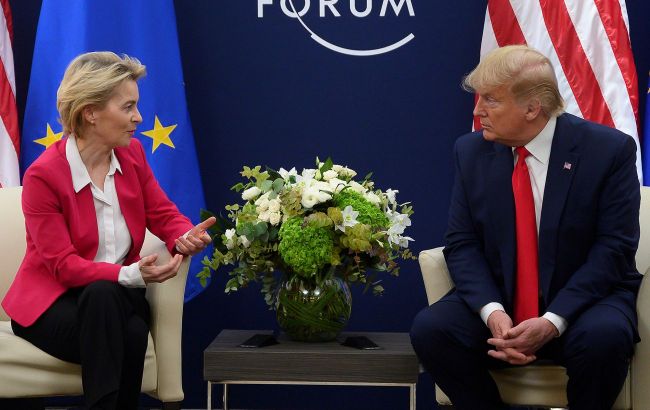EU fears Trump will reverse Biden's executive orders on sanctions against Russia - FT
 Photo: Ursula von der Leyn and Donald Trump (Getty Images)
Photo: Ursula von der Leyn and Donald Trump (Getty Images)
EU officials are analyzing hundreds of executive orders, including those on sanctions against Russia, imposed by US President Joe Biden. Concerns are growing in Brussels that Donald Trump will reverse them, according to Financial Times.
Brussels is concerned that Trump may try to reverse his predecessor's decisions simply because they were made by Biden, without much thought to the consequences of such steps for European allies.
According to three people briefed on the initiative, senior European Commission officials have ordered a review of Biden's executive orders, which cover a wide range of issues from sanctions against Russia to trade and cybersecurity, to see which reversals could have the most impact on the bloc or undermine its measures.
“The concern is he decides to reverse things just because Biden had done them. We need to know how that could affect us,” one source said.
The rush ahead of Trump's inauguration on January 20 underscores the EU's uncertainty about what the president-elect might do when he returns to the White House after threatening close US allies.
In recent days, Trump has refused to rule out the use of military force or imposing tariffs on Denmark to force it to sell Greenland. He also suggested that Canada should become part of the United States, as well as the Panama Canal.
Presidential decrees
According to officials, the EU's biggest concern is that Trump will reverse numerous Biden executive orders that imposed sanctions on Russia over its full-scale invasion of Ukraine starting in 2022. Officials in the bloc hope that Trump will keep these sanctions in place to use them as potential leverage in any possible ceasefire talks with Moscow.
A spokesperson for Trump's transition team said that the president-elect has been given a strong mandate to fulfill his campaign promises and disrupt the status quo in Washington.
Last summer, the European Commission set up an internal group of senior officials to develop a strategy for the potential consequences of a second Trump presidency and how to contain or respond to them. The focus has been on issues such as potential trade conflicts, a reduction in US support for Ukraine, and a possible shift in Washington's commitment to European defense and security.
Executive orders are issued only by presidents and can be revoked at any time. Usually, a new president revises existing decrees shortly after taking office. In 2017, Trump reversed the rapprochement with Cuba initiated by his then predecessor, Barack Obama, and withdrew from the Paris Climate Agreement. A year later, he suspended US participation in the nuclear deal with Iran brokered by the Obama administration.
According to Bloomberg, European Commission President Ursula von der Leyen wants to organize a meeting with Donald Trump before his inauguration as US president. According to the agency's sources, the EU official and Trump's aides have held talks, but it is not yet clear whether it will be possible to organize a visit to his Florida estate before January 20.

